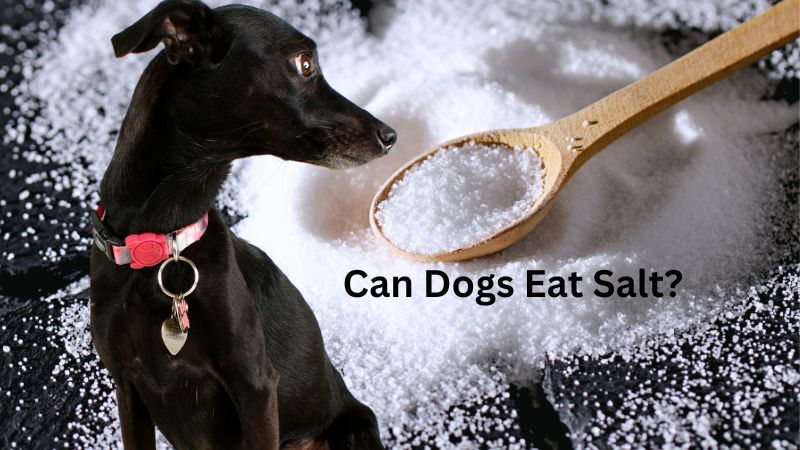
Salt is safe for humans to eat; does this also mean that dogs can eat it too?
It is okay for dogs to consume salt in moderation under the supervision of their caregivers. A moderate amount of salt is essential to a dog’s diet, so as long as you give your dog a reasonable amount, it will be fine.
A dog’s salt intake is critical for keeping them in good health, as too much or too little salt can lead to health problems.
When including salt in your canine’s meal, consult your veterinarian first.
It will be easier for you to understand everything you need to know about salt in a dog’s diet after reading this article.
Why Is Salt So Beneficial for Dogs?
Many foods contain salt, including human foods and dog treats.
But, likely, you will not be able to find sodium on your dog’s food’s ingredient list if you are looking for it.
Because the salt content of your dog’s food is determined by the meat used to make it,.
So, this naturally occurring salt is required for your dog to sustain their energy levels and maintain their bodies.
Salt deficiency: What Happens?
The amount of salt in your pup’s diet is significant to their health, affecting many bodily functions. Aside from that, it can cause a multitude of significant complications.
The most common symptom of sodium chloride deficiency is hyponatremia, which is characterized by low sodium levels in the blood. Insufficient salt consumption may cause your dog to suffer from this condition.
However, it can also happen naturally if your dog suffers from an imbalance that prevents them from absorbing enough sodium into its body.
This condition is characterized by the following symptoms and indications that suggest or indicate that your pet may be suffering from it:
- Tiredness
- Vomiting
- A lower level of alertness
- Seizures
- Appetite loss
- Anxiety
- Physique weakness
Can my dog eat salt safely?
When the food is formulated correctly, they are given only the right portion for their body weight. Hence, you don’t have to stress the salt content of your pup’s food.
The occasional addition of salt shouldn’t be a problem, but excessive salt intake can lead to health concerns for your dog.
Salt overdose in dogs: what happens?
An excessive amount of salt can pose the following health risks to your pet:
- Deficiency of water: Excessive salt consumption can cause dogs to become dehydrated quickly.
As a result of excessive salt consumption, severe dehydration can cause lethargy, confusion, and other adverse neurological effects.
The presence of high sodium levels in your dog’s system can also lead to muscle cramps and stiff joints in your pet.
- Hypertension: Dogs with hypernatremia have high blood pressure, and high salt levels in their blood characterize hypernatremia.
Furthermore, if you naturally have a pet with high blood pressure, you should avoid feeding it salty foods.
Perhaps they should switch to foods that are low in sodium.
- Intoxication from salt: You should be aware of salt ion poisoning in your dog, which may occur if your dog consumes large quantities of salty snacks, rock salt, or table salt.
A severe sodium imbalance is a chronic medical condition that can cause severe digestive issues, muscle tremors, heart attacks, and even death in some cases.
Suppose your pet shows signs of ionized salt toxicity. In that case, it should be taken to the veterinarian as soon as possible, so IV fluids and other life-saving treatments can be administered.
Salt-induced symptoms in dogs
The following symptoms may appear in your dog if he is suffering from salt poisoning:
- The first sign of dehydration in dogs that consume too much salt is an extreme thirst for water.
- If your dog consumes a lot of salt, ensure he has plenty of water. Ensure that you fill it up regularly so that your pet’s liquid intake requirements are met and their system returns to an average fluid balance.
- Additionally, if your pup consumes too much salt, he may experience increased urination, a condition known as polyuria, characterized by frequent urination.
- However, you should also be aware that frequent urination is sometimes a sign of kidney disease or a urinary tract infection.
- A few gulps of ocean water or small amounts of sodium could cause your dog to experience gastrointestinal upset, resulting in excessive thirst, vomiting, diarrhea, and a lack of appetite.
- When your dog is given fresh drinking water, most of these minor health problems should pass once his rehydration improves.
The best action is to seek medical treatment if these symptoms persist.
Frequently Asked Questions
Is salty food safe for dogs?
While we humans love salty foods such as fries and chips and sometimes even add extra salt to taste, large amounts of salt are not recommended for dogs.
The electrolyte salt plays a vital role in maintaining water balance, regulating nerve activity, and maintaining blood pressure. So, salt consumption must be within a healthy amount in their diet.
The ingredients of commercial dog foods also contain sodium, whether naturally occurring in the elements or as an additive.
But too much sodium intake can lead to salt poisoning, including thirst, nausea, trembling muscles, confusion, seizures, and diarrhea.
Providing dogs with clean drinking water is one of the best ways to prevent salt poisoning.
Dogs should avoid sodium-rich foods and products.
Many commercial dog foods contain enough salt to meet your dog’s daily salt requirement, but health problems could arise if your dog exceeds that limit.
The problems can range from dehydration to salt poisoning and toxicity, leading to death if left untreated.
These are the most common products that cause salt poisoning:
- Seawater
- Adding salt to the bath
- Snacks with sea salt coating
- Sodium bicarbonate (Normal Salt)
Using rock salt on icy roads and sidewalks is dangerous for dogs (chances of salt ingestion increase).
Human foods harmful to dogs:
- Fast food
- Potato chips, pretzels, and crackers
- Hot dogs, sausages, and lunch meats that are highly processed
- Cheeses
- Prepared canned meals, vegetables, or soups
- Pizza
Water-encouraging tips for dogs
Some dogs will instantly go for a bowl of clean water, but others will require a little encouragement.
Water consumption is an effective way to prevent sodium overload in your dog.
To make water more inviting, follow these tips:
- Adding sodium-free broth to their water will help them stay healthy
- Maintain a clean water bowl for them
- Place their water bowl in a new place so that they are more comfortable
- It would be a good idea to add a few more water bowls around the house
Conclusion
It can be tricky to deal with salt, especially with dogs, since there is a fine line between what your dog needs to stay healthy and what is harmful to them.
If you want to keep your pup healthy and happy, it is best to avoid giving him any salty food from humans. It is also advisable to ensure they have access to clean water as much as possible and prevent access to harmful items in the household.
Yes, your dog can have salt. The key is not to give them too much salt since too much salt could be harmful to pets’ health. We hope we have provided you with all the answers you need to judge your health accurately.
However, you should reach out to your vet if you are concerned regarding your pooch’s consumption of salt. They can provide detailed information on your pet’s needs to live a strong and healthy life.


Leave a Reply